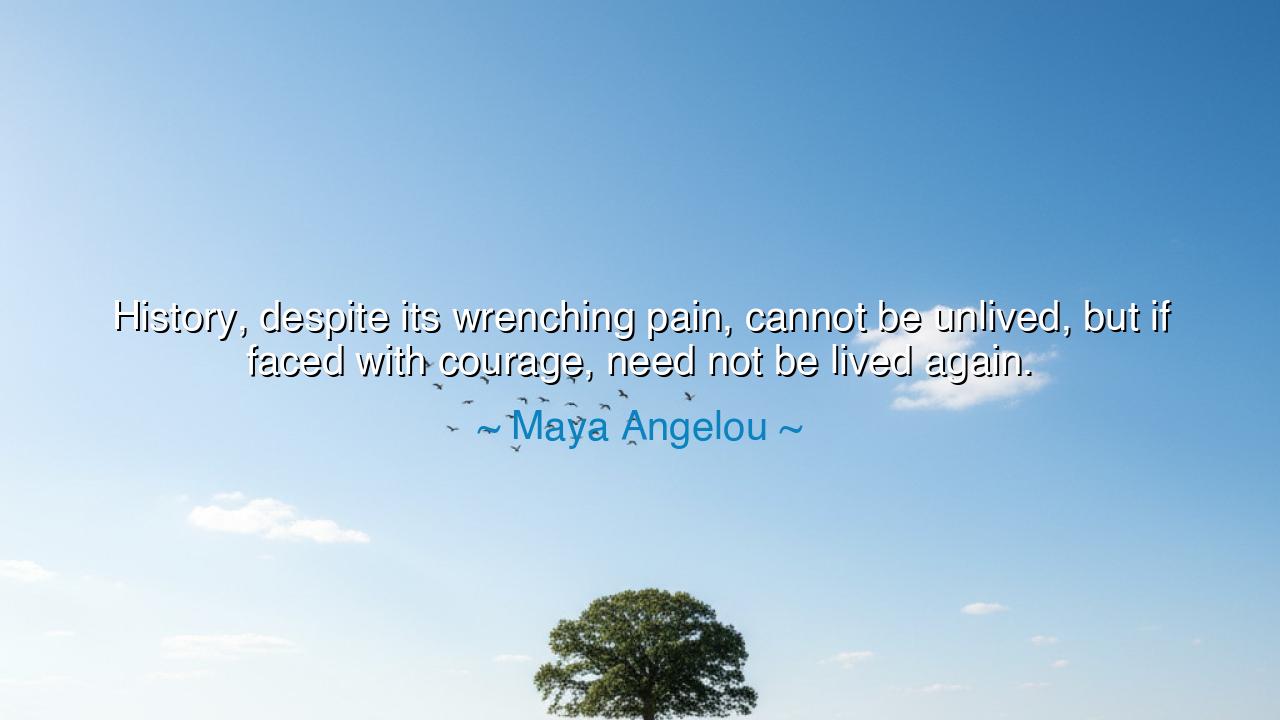
History, despite its wrenching pain, cannot be unlived, but if
History, despite its wrenching pain, cannot be unlived, but if faced with courage, need not be lived again.






Hear now the mighty and compassionate wisdom of Maya Angelou, poet of truth, daughter of endurance, and voice of the unconquered human spirit. She spoke: “History, despite its wrenching pain, cannot be unlived, but if faced with courage, need not be lived again.” These words, carved in the fire of experience, are not mere reflection — they are a call to awakening. In them, Angelou teaches that though the past may wound us, it is not our prison; though its scars may ache, they can become the markings of wisdom. For history, however painful, must be faced — not hidden, not denied — if we are ever to step beyond its chains.
Maya Angelou, born in the deep shadows of racial segregation and hardship in America, rose to become one of the great voices of her century. She knew suffering firsthand — the cruelty of prejudice, the trauma of silence, and the long march toward freedom and equality. Her words come not from abstraction, but from life itself. She understood that history, both personal and collective, often carries sorrow that feels unbearable. Yet she also knew that denial keeps humanity bound to repetition. To heal, we must face the truth with courage — the courage to look at the darkness without being consumed by it, the courage to forgive without forgetting, the courage to build anew upon broken ground.
To say that history “cannot be unlived” is to accept the immutable nature of time. What has been done cannot be undone. The cruelty of oppression, the devastation of war, the injustices of the past — these cannot be erased. But they can be redeemed. Angelou reminds us that while we cannot change what has been, we can change what shall be. The past is a teacher; its lessons, however bitter, are meant to awaken wisdom. When we turn away from those lessons, pretending the pain was never there, we condemn ourselves to relive it. But when we stand before it with open eyes and humble hearts, we are granted the power to transform suffering into strength.
Consider the story of Nelson Mandela, who, like Angelou, lived through the brutal machinery of racial oppression. Imprisoned for twenty-seven years, he emerged not filled with vengeance, but with peace. He faced the wrenching pain of his people’s history — not with denial, but with courage. Through the power of forgiveness and reconciliation, he broke the ancient cycle of hate that had gripped South Africa. He could not unlive the injustice, but by confronting it, he ensured that his nation need not live it again. His life was the living embodiment of Angelou’s truth: that courage is the bridge between past suffering and future peace.
But this teaching is not only for nations; it is for every soul that carries its own private history of sorrow. We all have wounds that ache when remembered — betrayals, failures, losses. The instinct of the heart is to turn away, to bury pain beneath the soil of forgetting. Yet, like roots hidden in darkness, the unacknowledged past continues to grow, shaping our present in unseen ways. To face it with courage is to bring it into the light, where it can no longer rule us. The man who dares to confront his own past frees himself from its grasp; the woman who forgives her former pain walks unburdened into tomorrow.
Maya Angelou’s wisdom calls for both remembrance and transcendence. To face the truth is not to dwell in misery, but to claim mastery over it. She speaks to a universal law: that courage heals what denial only hides. It is the fire that purifies memory, turning bitterness into insight. Whether the history is that of a person or a people, its redemption begins with truth — spoken, faced, and embraced. Only then can the future be written in new ink, untainted by old sorrows.
So, my child, let this teaching take root in your soul. When the past calls with its pain, do not flee, and do not drown. Stand tall and meet it with the courage of one who seeks freedom, not escape. Look at the wounds of your life and the world, and say: “You shall not rule me, but you shall teach me.” Let every tragedy become a teacher, every scar a story of growth. For the past, once faced, loses its power to wound again — and the one who faces it becomes not its victim, but its master.
Thus spoke Maya Angelou, the mother of resilience: “History, despite its wrenching pain, cannot be unlived, but if faced with courage, need not be lived again.” Her words shine like a torch in the dark corridors of time, guiding all who have suffered toward the dawn of healing. Remember them well — for they remind us that the only true freedom lies not in forgetting, but in forgiving, not in hiding, but in rising. And when humanity learns at last to face its history with courage, it will finally be free to write a new one — in the ink of compassion, in the language of peace.






AAdministratorAdministrator
Welcome, honored guests. Please leave a comment, we will respond soon